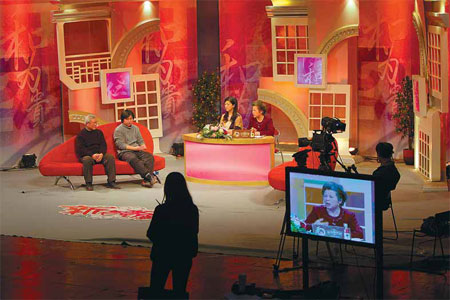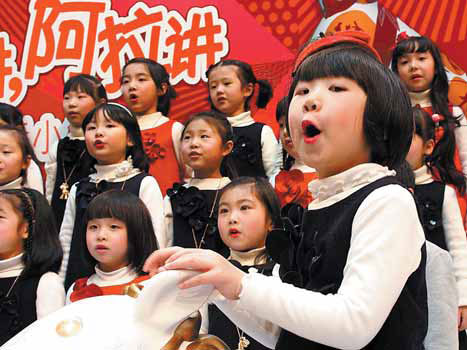Shanghai dialect locked in tug of war with Mandarin
Updated: 2014-02-28 07:22
By Xu Junqian in Shanghai (China Daily USA)
|
||||||||
Television show's change of language sparks controversy, reports Xu Junqian in Shanghai.
The term Lao Niang Jiu, or "old uncle", a well-known character in Shanghai folklore, is frequently used by the city's residents to describe prying busybodies who are always ready to meddle in other people's affairs.
Now, though, Shanghai's best-known and most-meddlesome "old uncle" has switched to using broken Mandarin, rather than his signature colloquial and idiomatic Shanghai dialect, when interfering in family affairs.
In 2008, New Old Uncle, a TV program named after the character and produced by Shanghai Media Group, was first aired by a local channel.
It was an immediate success. The initial 30-minute program, later extended to an hour, features two sides - usually from the same family - attempting to resolve a dispute. The warring factions are overseen by an amateur mediator, usually an experienced meddler from the local community.
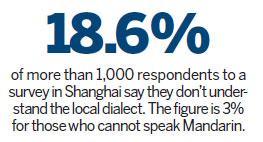
The program is especially popular among housewives cooking the family dinner. The star mediator, Bai Wan-qing, ironically a 60-something aunt rather than an uncle, has even been dubbed "China's Oprah Winfrey".
But the program, one of Shanghai's most popular local products along with the city's soup dumplings, is losing its local flavor because of the change from the Shanghai dialect to Mandarin.
In early January, the State Administration of Press, Publication, Radio, Film and Television, issued a notice stating that all TV and radio programs must use Mandarin and should avoid dialects and foreign languages. The measure was aimed at further promoting the use of Mandarin, or putonghua ("common speech"), and regulating the use of alternative languages on TV shows.
Disappearing dialects
It's not the first time the country's media regulator has prescribed a favored language for use on TV and radio. But the notice, like a stone thrown into still waters, has produced many ripples and sparked heated discussion about China's rapidly disappearing dialects.
In a phone interview, Yin Qingyi, the producer of New Old Uncle, denied that the change of language on the most-watched TV program in the southern metropolis came in response to the official notice. Instead, Yin called it "a reflection of reality".
"It's a reality show. That means the language spoken during the show is not decided by us," he said. Yin estimated that 75 percent of participants speak Mandarin as their mother tongue, which means the mediators must use the language too, even though they are mostly Shanghai natives.
Research conducted by the Shanghai Statistics Bureau in February supported Yin's assertion. It found that Shanghai residents now use Mandarin more frequently in their daily lives, to the detriment of Shanghainese.
More than 1,000 residents aged 13 and older who have lived in the city for more than six months were interviewed, including both natives and newcomers. The results showed that while only 3 percent of respondents were unable to speak Mandarin, 18.6 percent didn't understand Shanghainese.
In addition, interviewees aged 13 to 20 recorded lower scores in tests designed to assess their ability to speak and comprehend the Shanghai dialect than any other age group. "The reality may be even worse," said Qian Cheng, a member of the Shanghai committee of the Chinese People's Consultative Conference and a passionate advocate of his home dialect.
"Young people are giving up the language, both because they are not good at it - if capable at all - and don't have to use it often. At the same time, older people are accommodating their offspring by speaking pidgin Mandarin, which has left the local tongue under an unprecedented threat," said Qian.
During the city's annual two sessions in January, Qian proposed that Shanghai should create a dialect-friendly environment for Shanghainese and encourage young people to use the language more, at least at home.
"If the 20- and 30-somethings desert the language, it's highly unlikely that their offspring will be able to pick up it again," he said.
Reasons to be cheerful?

But Shen Lei, the anchor of the popular radio talk show A La Shanghai Ren (We Shanghai people) painted a less-gloomy picture.
The program, which has aired on Shanghai East Radio Station every day from 6 to 7 pm for nearly two decades, features a male and a female anchor chatting about domestic trivialities, speaking exclusively in the local tongue. The show has long been a favorite of office workers killing time as they travel home, and families looking for entertainment during dinner.
"The fluency and accuracy (of spoken Shanghainese) may be declining, but there is keen interest in learning it," said Shen, who has hosted the show since just after it began in 1995.
At an event hosted by the program in mid-January, children and adults were invited to participate in a dialect contest. The response was overwhelming: hundreds of families filled the sleek and spacious hall of a Shanghai shopping mall, babbling and bumbling as if they were attending a language school.
"Many people are talking about the authenticity of the dialect spoken today, but I think what matters more is the fact that it's still being spoken. There is also the law of 'survival-of-the-fittest' in terms of linguistics. What is considered standard today might have been pidgin decades ago," said Shen, whose Shanghainese was "standardized" when she studied at the Shanghai Traditional Opera School.
Shen added that the program has been on and off for the past two decades (there is a complicated bureaucracy by which radio or TV programs obtain official approval to use dialects as official languages), and the support and enthusiasm of the audience is one of the major reasons for its continuing popularity.
The 41-year-old Shanghai native recalled that during her early years at school, she was chosen as the "Mandarin popularizer" in her class, supervising her classmates in spoken Mandarin, both in and outside the classroom.
"It's quite interesting to see how the situation has reversed within less than half a century," she said.
'Beijing dialect'
Mandarin, once known as "Beijing dialect", was first selected as China's national language in the 1910's, because of the "Beijing accent being dominant and combining certain elements of other northern and southern dialects." But it wasn't until the late 1940's, with the founding of the People's Republic of China, that Mandarin was designated as "standard" Chinese.
In October 2000, the Law of the People's Republic of China on the Standard Spoken and Written Chinese Language was adopted. It regulated and encouraged the use of Mandarin in the media, education and the public-service industry.
There are about 80 dialects among China's 56 ethnic groups, according to linguist Zhou Youguang. But unlike the less-developed regions and cities, where the population remains stable and the dialect can be passed down through the generations, Shanghai has embraced dreamers and "goldminers", people from other cities who have arrived in hope of making a fortune, from all over the country. That influx has led to the local dialect becoming marginalized.
The protective attitude toward the dialect has caused offence among some new settlers in the metropolis, who argue that its use alienated people from other cities and provinces.
In January, the Shanghai Municipal Education Commission initiated a pilot program to encourage kindergartens in the city to "combine the teaching of the Shanghai dialect in the preschool syllabus". The preferred method involves children learning traditional folk rhymes in the dialect, something the authorities believe will be "less burdensome" for Mandarin-speaking children.
However, the notice sparked controversy and accusations of "elevating a dialect above all other languages". On Sina Weibo, China's Twitter-like social media, the theme "Speaking the Shanghai dialect in kindergartens" has garnered more than 133,000 responses. While natives have given the policy the thumbs up, some non-natives have thumbed their noses at it.
Under the user name "Laobusi1930", one Beijing-based netizen asked whether it is "so important to speak the Shanghai dialect", and saw an aloofness among the Shanghainese-speaking population. "They even speak Shanghainese in other cities simply to show off that they come from Shanghai," as he put it.
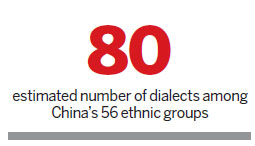
"There is, and should be, no conflict between Shanghainese and Mandarin," said Peng Ke, one of the production staff of the TV news program Xinwenfang, which until recently broadcast daily news in the Shanghai dialect
The program, the first to broadcast news reports in the local tongue, is highly popular. Its ratings were far above average after it began broadcasting in Shanghainese in 2012. But the difficulty of synchronizing subtitles led to the reinstatement of Mandarin in October.
"Shanghainese is by no means superior, nor inferior, to any other language. The reason we attach great importance to it is that, as a language, it is on the verge of dying. And it shouldn't, because it's more than just a language," said Peng.
Liu Jianmei, who teaches a Shanghai dialect course for foreign students from Shanghai Tongji University, suggested that to maintain the language, the government should make it a compulsory course in the local school curriculum.
However, despite claim and counterclaim, it may simply be that the language is succumbing to a natural death because some of the younger generation see no value in learning and maintaining it. After all, every year millions of people in Shanghai and the country voluntarily pay several thousand yuan and burn the midnight oil to study, take exams and gain qualifications through programs such as the International English Language Training System and the Test of English as a Foreign Language.
For Yao Ying, a 26-year-old office worker who hails from Zhejiang, the province that neighbors Shanghai, the city's native language offers little of value: "It costs me little if I don't understand Shanghainese. If I have to spend time and money learning a language, I'd rather improve my English, which might increase my chances of landing a better job or even a better life."
Contact the author at xujunqian@chinadaily.com.cn
|
A scene from New Old Uncle, one of the most popular TV programs in Shanghai, which until recently was presented in the local dialect. Gao Erqiang / China Daily |
|
Children attend a dialect contest in Shanghai. Many locals have displayed a keen interest in preventing Shanghainese, the local dialect, from being replaced by Mandarin. Chen Fei / Xinhua |

(China Daily USA 02/28/2014 page7)

 US first lady dances with kindergarten kids
US first lady dances with kindergarten kids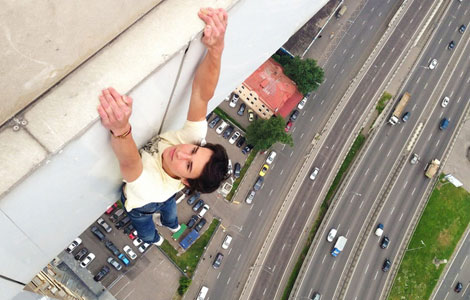
 Death-defying skywalkers post stunning images
Death-defying skywalkers post stunning images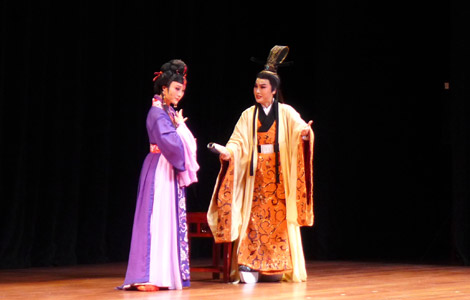
 Ibsen gets a Chinese spin in New York
Ibsen gets a Chinese spin in New York
 LA rolls out the red carpet
LA rolls out the red carpet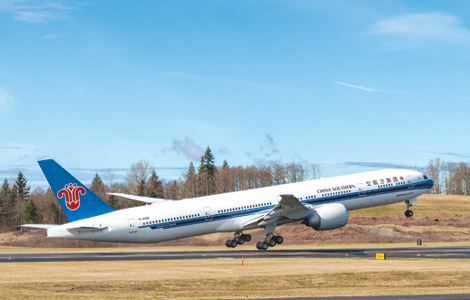
 Airline receives its first Boeing 777-300
Airline receives its first Boeing 777-300
 Freediver takes cheeky selfie with sperm whale
Freediver takes cheeky selfie with sperm whale
 Buried gold coins unearthed in California
Buried gold coins unearthed in California
 Beaming with pride
Beaming with pride
Most Viewed
Editor's Picks

|

|

|

|

|

|
Today's Top News
China issues report on US human rights
Program to help US young minority
China ignores ticking time bomb of increasing waistlines
Shanxi Taxus Pharma to acquire US medical firm
DPRK launches short-range missiles
Chinese sue Japanese firms
TPP talks in final stretch: diplomat
US space telescope spots 715 more planets
US Weekly

|

|
